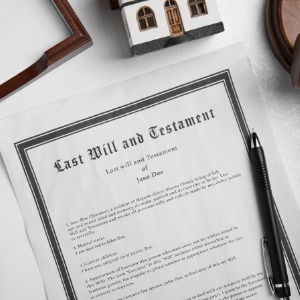
Inheriting a distressed home in Anchorage, Alaska presents unique opportunities and challenges. Whether you’re dealing with overdue taxes, maintenance issues, or seeking the best value for sale, understanding Alaska’s specific inheritance laws can turn a potentially stressful situation into a positive outcome. This guide will help you navigate the legal and financial maze of inherited properties, offering practical advice on selling, repairing, or renting out your newfound asset. With the proper knowledge, you can make informed decisions that align with your financial goals and preserve the property’s value in the beautiful Anchorage area.
Key Highlights
- Understanding Alaska’s probate process helps manage estates and resolve conflicts when inheriting distressed properties.
- Selling an inherited property in Anchorage requires careful planning, considering local market and legal obligations.
- Federal estate taxes affect inherited Alaska properties; consult experts to navigate tax obligations effectively.
- Market unique Alaskan home features to attract potential buyers, emphasizing natural beauty and practical adaptations.
- Decide to sell or rent based on market conditions and personal financial goals to optimize property management.
Understanding the Probate Process in Alaska
The probate process in Alaska is a crucial element for individuals who inherit properties, notably distressed homes in Anchorage. It involves court-supervised procedures to validate wills, settle debts, and distribute assets. Understanding this process begins with knowing the role of the probate court, which is pivotal in managing estates and resolving disputes. Navigating through probate can seem daunting, but gaining insight into how it functions can alleviate stress and ensure compliance with Alaska inheritance laws. Each step of this journey requires careful attention, particularly when navigating intricate situations like distressed properties.
Essential Paperwork for Alaska Property Sales in Alaska

When preparing to sell an inherited property in Alaska, gathering the proper documents is the cornerstone of a smooth and successful transaction. Whether the property is in Anchorage, Wasilla, Eagle River, or elsewhere in the state, having the correct paperwork ensures legal compliance, builds buyer confidence, and helps prevent costly delays.
The process begins with two critical documents: the deceased’s will and death certificate. These establish your legal right to manage or sell the property. If you’ve been named as the personal representative (executor), you’ll also need to file your appointment with the probate court to gain official authority. Completing this step early streamlines the entire sales process and minimizes administrative complications later on.
Next, you’ll need to ensure the property deed is correctly updated to reflect your ownership. This document is your legal proof that you have the authority to sell the home. Alongside the deed, it’s vital to review the property’s tax history, including any outstanding liens or unpaid mortgages. Clearing these issues before listing the property not only avoids closing delays but can also make the property more attractive to potential buyers.
If the property is located in Anchorage or nearby areas like Palmer or Girdwood, local municipalities may have additional recording requirements or disclosure forms. Working with a real estate professional familiar with Alaskan property laws can help ensure all documents meet state and local standards.
In addition to the core documents, gather records for any movable assets associated with the property, such as vehicles, tools, or equipment. These items may seem minor, but they can affect estate settlements or title transfers. Ensuring these assets are adequately documented and cleared from the estate title provides a clean foundation for closing the sale.
Before finalizing the sale, it’s highly recommended to consult a legal advisor or probate attorney experienced in Alaska real estate transactions. Their expertise helps confirm that all necessary documents are accurate, up to date, and in compliance with state regulations.
Thorough documentation isn’t just about fulfilling legal requirements—it’s about empowering you to manage the sale with confidence and control. By staying organized and proactive, you can ensure a seamless transaction and secure the best possible outcome when selling your inherited property in Anchorage or any part of Alaska.
If you’re facing challenges managing these documents—or if the property is in distress—Anchorage Home Buyers can help simplify the sale. They buy houses for cash in Anchorage, Eagle River, and the surrounding areas, allowing sellers to close quickly and avoid the traditional listing process altogether.
Exploring Informal Probate in Alaska
Inheriting a distressed home in Anchorage can be a daunting task, especially when navigating the complexities of Alaskan probate laws. One pathway that might simplify this process is informal probate, a less rigid approach compared to formal probate proceedings. Informal probate in Alaska offers a streamlined procedure that can often expedite the distribution of assets, but it also comes with its own set of challenges. By delving into the benefits and drawbacks of informal probate for inherited property, heirs can better understand how this process fits into the broader context of managing an estate.
Benefits and Drawbacks of Informal Probate for Inherited Property in Alaska
When inheriting property in Alaska, especially a distressed home in Anchorage, understanding the informal probate process can help heirs manage estate affairs more efficiently. Informal probate offers a faster, simpler alternative to traditional probate, making it an appealing option for families seeking to settle an estate quickly and minimize legal expenses.
One of the most significant advantages of informal probate in Alaska is its speed and affordability. Because it requires less court supervision, the process typically progresses more quickly and incurs fewer administrative costs. The personal representative (executor) gains greater flexibility in managing the estate—a significant benefit when urgent decisions are needed, such as selling a distressed property in Anchorage before it loses additional value due to deferred maintenance or market fluctuations.
This streamlined approach allows heirs to liquidate assets faster, distribute proceeds efficiently, and avoid the lengthy court procedures that can delay property transfers. For many families, informal probate provides a more practical, less burdensome solution to handling an inherited estate.
Despite its advantages, informal probate also carries certain risks. The reduced court oversight places greater responsibility on the personal representative to act in full compliance with Alaska’s probate laws and in the best interests of all beneficiaries. Any errors in settling debts, valuing assets, or distributing property could lead to legal disputes or challenges from heirs or creditors.
Informal probate may also be less suitable for complex estates, such as those involving multiple heirs, unresolved debts, or contested wills. In these cases, the absence of formal court guidance can make conflict resolution more difficult and increase the risk of mismanagement.
To ensure the informal probate process runs smoothly, heirs and personal representatives should maintain meticulous records and transparent communication with all parties involved. Keeping detailed documentation of every transaction, decision, and communication helps protect against potential legal challenges and fosters trust among co-beneficiaries.
Because Alaska’s probate laws can be intricate, consulting an experienced estate attorney is highly recommended. A legal professional can assess whether informal probate is appropriate for your situation, guide you through the process, and ensure all actions comply with legal standards. Their expertise can make a significant difference in avoiding costly mistakes and ensuring the estate’s smooth transition.
Ultimately, deciding between informal and formal probate depends on the size and complexity of the estate, the number of beneficiaries, and the condition of the inherited property. For heirs managing inherited or distressed homes in Anchorage, informal probate may be the most efficient way to transfer ownership and move forward quickly—predominantly when guided by knowledgeable legal support.
Estate Taxes and Their Impact on Inherited Property Sales
Navigating the landscape of estate taxes in Alaska can significantly influence the process of dealing with distressed inherited properties in Anchorage. Understanding how estate taxes impact the sale of these properties is vital for heirs aiming to maximize value while remaining compliant. Although Alaska doesn’t impose a state inheritance tax, beneficiaries might still face federal tax obligations. It’s crucial to grasp these tax-related implications to make informed decisions and minimize potential liabilities related to the estate tax. To navigate efficiently, let’s delve into the specifics of estate tax obligations in Alaska.
Understanding Estate Tax Obligations in Alaska
While Alaska does not impose a state-specific estate or inheritance tax, heirs must still consider federal estate tax laws, which may apply depending on the overall value of the deceased’s estate. This distinction is crucial, as federal estate taxes can significantly affect the financial outcome of inheriting or selling a property in Alaska.
Federal estate taxes are based on the total assessed value of the estate, including real estate, financial assets, investments, and personal property. If the estate’s value exceeds the federal tax exemption threshold, beneficiaries may be responsible for paying federal estate taxes. Understanding this threshold is essential, as it determines whether taxes will apply and how much of the estate’s value will be subject to federal taxation.
For those inheriting distressed properties in Anchorage or elsewhere in Alaska, these potential tax liabilities can influence key decisions—such as whether to retain the home, invest in renovations, or sell the property outright to simplify the estate’s financial responsibilities.
The first step in addressing estate tax obligations is to conduct a comprehensive valuation of the entire estate. This includes appraising the property, calculating outstanding debts, and evaluating the total worth of financial accounts. By understanding the estate’s actual value, heirs can determine whether they fall within taxable limits and prepare accordingly.
If the estate is large enough to trigger federal estate taxes, strategic tax planning becomes vital. Beneficiaries can work with tax professionals to explore deductions, credits, and exemptions available under federal tax law. Proper planning can help minimize liabilities and preserve more of the estate’s value for heirs.
Because the intersection of federal tax laws and Alaska property regulations can be complex, consulting an estate attorney or tax advisor is strongly recommended. These professionals can assist in filing accurate tax returns, ensuring compliance with all legal requirements, and helping heirs avoid unnecessary penalties or disputes.
This guidance is crucial for heirs managing distressed or inherited real estate in Anchorage, where timing and condition often play a role in determining the best course of action. Advisors can help you evaluate whether selling the property quickly is the most financially advantageous choice, especially when weighed against ongoing maintenance costs and potential tax obligations.
Ultimately, effective estate management goes beyond simple compliance—it’s about maximizing the estate’s value while ensuring a smooth transition for beneficiaries. Understanding your estate tax obligations in Alaska, supported by expert legal and financial advice, allows you to make informed decisions and avoid unexpected setbacks.
By staying proactive and informed, heirs can fulfill their tax duties responsibly while protecting their inherited property’s worth—paving the way for a successful and stress-free inheritance process.
Strategies for Managing Inherited Property
Managing an inherited property, especially a distressed one in Anchorage, involves several strategic steps that can mitigate stress and maximize potential value. Initially, it’s crucial to assess both the property’s market value and physical condition to make informed decisions. Additionally, considering whether to sell or rent the property will shape your management approach, influencing the resources and time required. Understanding these strategies, from assessment to ultimate disposition, helps heirs navigate complex inheritance scenarios effectively, ensuring compliance with Alaska’s legal and real estate landscape while optimizing financial outcomes.
Assessing the Value and Condition of the Property in Alaska
When inheriting a property in distress, especially in an Alaskan city like Anchorage, the very first step it to evaluate the real estate and its worth, which is to said to be the value on a property in the market. This kind of evaluation is a prerequisite to every decisions that follow after that, and so, the decisions can either be to renovate, remodel, rent or sell.
A property’s worth can be determined through a real estate appraisal, which is said to be the marketable value of a property. The estate appraiser has to look at the location, total size of the property, value added features and the real estate prices in Anchorage and adjoining places like Wasilla, Palmer and Eagle River to gauge the property’s value. In the process, it becomes clear what the worth of the home has become, and what the value is and what depreciation is or issues are that can hinder the rent or sell process. An appraisal’s value and a saleable value are two different things and so, you will have to either be willing to sell your house fast or have to charge a rent that is of an investment property.
Inspection beyond the scope of appraisal services is still critical, because there may be structural, mechanical, or even cosmetic issues that would hinder the marketing of the home. Distressed property issues, including but not limited to, structural damage, roofing, and even the antiquated plumbing and electrical work, are going to be more than critical to your financial assessments. Local contractors can provide repair cost estimates, allowing an analysis of whether a sale “as is” or post-renovation represents a more sensible economic proposition.
It is also essential to look at the property’s legal and financial encumbrances, such as mortgages, liens, and even unpaid taxes. Paying attention to these issues resolves complications that may arise during the probate or selling process, as well as clarify the actual net worth of the estate to the heirs.
Integrating financial, physical and legal aspects of the property lets you formulate your conclusions and approach decision making rationally and thoroughly. Based on the information, choosing between retaining or selling becomes a matter of aligning it with the goals you plan to achieve in the future.
Valuation is of utmost importance to the seller. To strengthen your stance in the negotiation process, it is critical that you also provide an inspection report, as it will increase the buyer’s confidence and streamline the sale. Informed and strategic decisions can be made after speaking with local Alaskan real estate professionals as well as appraisers and inspectors who understand the Anchorage market. This ensures the inherited property is fully optimized for its sale or if it is kept as an investment.
If significant repairs are required or the property is difficult to maintain, working with Anchorage Home Buyers can be the best route. They buy houses for cash in Eagle River and nearby cities —no repairs, cleaning, or realtor fees necessary. This option helps heirs quickly liquidate inherited properties, freeing them from maintenance stress and property tax obligations.
How to Legally Navigate Inheritance Laws in Alaska
Inheriting property in Alaska involves understanding a complex web of legal standards, especially when the property is distressed. The process is governed by state inheritance laws, often requiring beneficiaries to navigate intricate legal and financial procedures. Incorporating legal assistance can simplify this journey significantly. Engaging an experienced estate attorney ensures compliance with Alaska’s unique rules on inheritance and intestate succession. Moreover, managing the roles of personal representatives and understanding filing requirements are crucial steps in this process. Here’s how hiring an estate attorney can prove invaluable in navigating this challenging landscape.
The Importance of Hiring an Estate Attorney for Alaska Inheritance

One of the most astute choices heirs can take is the retention of an estate attorney while managing an inherited property in Alaska. Having legal assistance is essential given the complexity of Alaska inheritance laws and probate and legal aid can make specific every procedure is performed in the most accurate and timely fashion. An attorney will help you deal with probate with assurance and lucidity whether you are managing a simple estate or a more complicated case of intestate property.
An estate attorney is essential in grappling with the legal complexities involved in every step of the settlement of the estate. They will help in identifying and solving some of the legal questions raised, such as disputes among heirs and heirs who withdraw or make asset distributions or estate claims. This is extremely important when dealing with inherited property or distressed homes in Anchorage, where title clearance and estate property condition may complicate the transfer process. Alaska estate probate attorneys will assist you in determining which probate process your case is more suited to, and whether it qualifies for formal or informal probate, all with a focus geared toward the most efficient legal route to take.
In Alaska, the personal representative has the duty of managing the estate, which involves estate paperwork, settling debts, and asset distribution. Without professional help, this can be a daunting assignment. An estate attorney will help the representative do these works competently by adhering to relevant regulations on the applicable state and federal laws in protecting the interest of the beneficiaries.
By guiding attorneys keep managing the estate carefully, they minimize the risk of financial errors, losses, or breaches of trust and duty from delayed payments. The attorneys ensure that compliance and verification of claims is done. They make sure that these debts, claims, and taxes are settled and verified before the distribution of the estate is done. Estate valuation, especially real estate, financial accounts, and personal property will benefit more from their help.
Attorneys can help their clients on estate planning to help minimize taxes that will be incurred on the estate and gained as inheritance. This is especially important for heirs as it enables them to retain more value of what they inherited. This is important for those in Anchorage as it guides them on deciding on estate investment on rental, sale, or retention.
The emotional and financial burden of inheritance can be heavy and how one deals with it can be stressful. An Alaska estate attorney makes sure all matters of the estate are solved legally and archives the proper estate planning peace required by the heirs thus allowing them to focus on the preservation of the family legacy and essential steps necessary to be taken in the future.
Marketing an Inherited Property to Potential Buyers
When you inherit a property, especially in a unique landscape like Alaska, effectively marketing it can make all the difference. Highlighting the distinctive features of homes in Alaska and understanding the current real estate trends are pivotal steps to attracting potential buyers. By focusing on showcasing what makes Alaska properties special, you can appeal to both local and out-of-state buyers looking for real estate in a stunning geographical area. From leveraging Alaska’s natural beauty to tapping into online marketing strategies, each element plays a crucial role in maximizing interest and ensuring a swift, successful sale.
Effective Ways to Highlight Unique Characteristics of Alaska Homes
With Alaska’s unparalleled views and unique culture, the state’s real estate market is like no other. For heirs wishing to sell property in Anchorage, marketing the unique aspects of each property for sale is a significant step in standing out to potential buyers.
Alaska’s unique natural beauty is a primary driver for people wanting to move to the state. Buyers passionate about the outdoors and looking for a quiet, adventurous lifestyle are easily won over by homes that are adjacent to mountains, forests, and waterfronts. To market these views, you should be promoting these views in your marketing materials.
Buyers often form emotional attachments to visuals and Alaska has an incredible natural setting that is evocative. Use these views to help buyers remember your listing and set it apart from the competition.
Other than it’s incredible views, homes in the state have architecture that is meant to help withstand the frigid weather. Buyers are placed at ease when hearing about such provisions of gentle and durable insulation, winterized bay windows, gas fireplaces, and triple-glazed windows placed around an open-plan dining area.
In this case, the buyer is not simply purchasing one property. Instead, they are acquiring an entire living space that is comfortably settled for the entire. It is ready to be lived in, year round, for people residing in Anchorage and the neighboring regions of Wasilla, Palmer, and Eagle River.
If the property possesses any historical charm or cultural value, embrace it and develop it further. Buyers are frequently enamored with homes possessing intriguing stories or architectural features consistent with the history of Anchorage. By describing these narratives, be it listing descriptions, blog posts, or social media posts, evokes a bond and hence enhances the home’s charm.
To better engage an audience and scope, adopt an digital marketing approach that showcases the property’s core features. Use social media, and other real estate and community websites, to disseminate captivating photos and narratives. Produce short films and virtual escapades revolving around the property’s character and the Alaskan lifestyle. This approach does not only heighten visibility but also reaches buyers interested in properties offered for sale in Anchorage or buyers interested in buying houses for cash in Alaska.
With a combination of captivating images, compelling stories, and regional knowledge, you can guarantee that the property you have inherited will no doubt be unique to the Alaskan real estate market. The right approach will connect you to serious buyers who appreciate the charm and value of the property. This means you can quickly sell your house in Anchorage and continue with your next ventures without any issue.
Should You Sell or Rent Your Inherited Property in Alaska?
Deciding whether to sell or rent an inherited property in Alaska hinges on various factors such as market conditions, personal financial goals, and the property’s condition. The discussion involves understanding the implications of both choices in the context of Anchorage’s unique market dynamics. By weighing the pros and cons of keeping versus selling the property, inheritors can better navigate their options, ensuring they make an informed decision. This choice will shape the estate’s management strategy, impacting long-term financial outcomes while adhering to Alaska’s legal and real estate norms.
Pros and Cons of Keeping vs. Selling the Property
It is a significant emotional and financial undertaking when trying to determine whether one should retain or sell an inherited property in Alaska. Every choice represents a different opportunity with both advantages and disadvantages, which may cause considerable stress and uncertainty.
The financial support a person may receive from selling a property is financial relief for those estates containing liens or owing money. Selling one’s inherited property in Anchorage is often done for the purpose of cashing out quickly to invest the proceeds towards other investments, debt repayments, or personal objectives.
Selling a property in Anchorage still comes with its own benefits. Anchorage is a part of Alaska, and property of sale there, alongside the rest of the country, is a form of cashing out on one’s homestead. Selling property in Alaska comes with the added advantage of selling alongside other forms of real estate and during any. And property of sale benefits from any positive changes to the real estate market that may happen.
Owning property carries its own perks too. Having rented out property inherited from the estate may earn the heir financial support, plus retaining property in Wasilla or Eagle River deepens one’s equity and strengthens the overall financial position.
Owning a rental property also requires maintenance of the physical property, dealing with the tenants, carrying out repairs, and other associated legal duties which can be burdensome and costly. Rental income can be exceedingly volatile and lax upkeep of the property can result in downtimes during which the property is under market rent, during which periods the downtimes out of sync can also tremendously curb the property value appreciation.
A property can be a source of sentimental value for some heirs. In contrast, for some, the maintenance associated with the physical property can be a source of unbearable emotional distress mainly when it’s located far from the descendant’s place of residence.
Every individual case requires a bespoke approach especially to finances, set emotional barriers, and determine prevailing market dynamics. A strategic and analytical balance on the real estate market alongside real estate experts in the area of Anchorage can be advantageous financially and lend perspective to the case. Balanced and informed decisions can be viewed on the other end, as cashing an inheritance to safeguard the family’s legacy.
Is there an Estate Tax or Inheritance Tax in Alaska?
Understanding the estate tax implications in Alaska is crucial for heirs managing inherited properties. While Alaska does not impose its own estate or inheritance tax, federal taxes still apply based on the estate’s total value. This section will explore key financial considerations for heirs in managing these tax obligations effectively, providing insights into capital gains, property taxes, and necessary strategic approaches to minimize financial burdens connected to inherited estates in Alaska.
Key Financial Considerations for Heirs in Alaska

When dealing with the finances of an inherited property in Alaska, strategic approaches must be taken. Alaska does not have a specific state estate or inheritance tax, but beneficiaries should be aware of how federal estate taxes may be applicable. Federal taxes are determined by the estate’s value, which may include real property, bank accounts, and personal possessions. If the addition of all estate’s value surpasses the federal tax exemption, estate tax is paid by the beneficiaries.
Another essential concept is the property’s tax basis, which will determine how much capital gains tax the owner will have to pay if the property is sold in the future. Inherited property is granted a “stepped-up” tax basis, which means that the property is set to the fair market value at the time of death of the owner. This step is crucial because it could lower the capital gains taxes that the owner is liable to pay in case the property value appreciates.
The local property taxes that are still applicable in Alaska aside from federal taxes are crucial for your financial strategies. If the inherited house is kept or rented, then the annual property taxes, maintenance and potential repairs should be taken into account. In determining the selling price of the property, these expenses should not be overlooked to maximize the profits and minimize any disruptions.
To minimize any complications these complicated financial aspects should be analyzed by a financial advisor who specializes in Alaska real estate. Estate and capital gains taxes can be cumbersome for someone not familiar and these experts can ensure proper filing and strategize ways to diminish the overall taxed amount. Not only will adequate planning help avoid unnecessary penalties, but it will also serve to help retain the value of the property.
This property can be transformed into a valuable asset with the proper guidance and modern approaches used in its management. You can sell your house in Anchorage quickly, renovate it, or turn it into a rental. Still, the very first step towards any of these approaches is understanding the financial and legal aspects, which will help avoid complicated outcomes.
No matter your situation, Anchorage Home Buyers makes selling your home simple and stress-free by offering fast, fair, all-cash solutions across Anchorage and nearby areas. Contact us at (907) 331-4472 today to know more!
Frequently Asked Questions
What are the main challenges of inheriting a distressed property in Anchorage, Alaska?
Inheriting a distressed property in Anchorage entails dealing with overdue taxes, maintenance issues, and understanding Alaska’s specific inheritance laws. These can turn a potentially stressful situation into a positive outcome with the proper knowledge.
How does the probate process work in Alaska?
The probate process in Alaska involves court-supervised procedures to validate wills, settle debts, and distribute assets. The probate court plays a pivotal role in managing estates and resolving disputes, providing a fair and orderly procedure.
What documents are needed for selling an inherited property in Alaska?
Essential documents include the deceased’s will and death certificate, property deed, and records of the property’s tax history. Additional paperwork such as mortgage statements and resolutions for any outstanding liens may also be required.
How does informal probate differ from formal probate in Alaska?
Informal probate offers a less rigid procedure with reduced court oversight, allowing personal representatives greater autonomy. However, it also increases the responsibility to ensure compliance with probate laws and interests of beneficiaries.
What tax obligations should beneficiaries of inherited property in Alaska be aware of?
While Alaska does not impose its own estate or inheritance tax, federal estate taxes may still apply based on the overall value of the estate. Beneficiaries must consider both estate and capital gains tax implications.
Helpful Anchorage Blog Articles
- How To Opt Out Of An HOA In Anchorage, AK
- Can Medical Debt Threaten Your Home Ownership In Anchorage, AK?
- Home Equity Requirements For Selling Your House In Anchorage, AK
- Selling Your Anchorage Home After Three Years
- Selling Your House To A Developer In Anchorage
- Home Equity Requirements For Selling Your House In Anchorage, AK
- Can You Sell A House With Asbestos In Anchorage, AK
- What Taxes Do I Have To Pay When I Sell My House In Anchorage, AK
- Selling a Home That Needs Repairs in Anchorage, AK
- Understanding Tenant Damage And Property Rights In Anchorage, AK
- Sell A Home With A Reverse Mortgage In Anchorage, AK
- Average Cost to Sell a House in Anchorage, AK
- What To Do If You Inherit a Distressed Home in Anchorage, AK
- Can You Sell a House in Foreclosure in Anchorage, Alaska?

